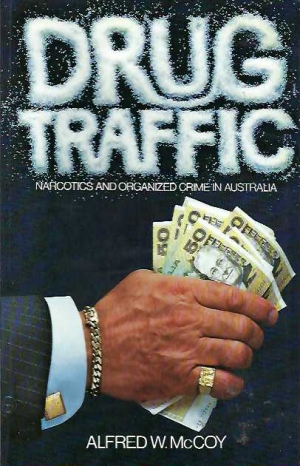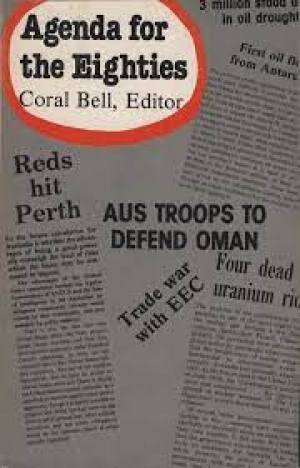Archive
George Munster reviews 'Drug Traffic, narcotics and organized crime in Australia' by Alfred W. McCoy
A gap of eight years is a big slice in a writer’s life: at the end, a changed man speaks in a different context. Al McCoy’s Politics of Heroin in Southeast Asia (1972) and his Drug Traffic: Narcotics and Organized Crime in Australia (1980) have the same publisher and the same villain, but they are very different books.
... (read more)Geoffrey Williams reviews 'Agenda for the Eighties: Contexts of Australian choices in foreign defence policy' edited by Coral Bell
This book is a useful acquisition for those anxious about Australia’s prospects in the 1980s and while it does not exude optimism it contains a generally hopeful outlook which, given the way things are going, could be a rare commodity in 1990. The topics covered are those thought the most complex and difficult which the policymakers are likely to confront this decade. The essays are of a variable quality and somewhat less than uniform in style but Professor Coral Bell gives this volume a focus and an overall perspective in her preface. Her excellent opening chapter and final remarks (arising from the debates at the ANU Seminar) make up for some of the deficiencies of her distinguished colleagues. As she observes, there is no great optimism to be found in these pages, but at least the prophets of doom have been held at bay. She writes that ‘anyone writing in 1979, and reasonably in touch with international opinion on matters like the possibility of a major depression, or an energy crisis, or SovietChinese or Soviet-American confrontations in the early 1980’s must be bound to take a rather sober view of the prospect for mankind, including Australians’. She asserts that the issues confronting Australia in the 1980s are likely to be those that were evident in the 1970s and that there remain almost immutably the same preoccupations, namely the search for security and prosperity. She must be right.
... (read more)Bernard Smith reviews 'A Dream of Islands: Voyages of self-discovery in the south seas: John Williams, Herman Melville, Walter Murray Gibson, Robert Louis Stevenson, Paul Gaugin' by Gavan Daws
What effect did life, does life still, exert upon Europeans in the Pacific? Does it weaken cultural bonds with Europe or does it sustain them? Does it set up alternative cultural standards by means of which European culture may be more critically assessed’) And individuals may more critically assess their own motivations? Are their lives fulfilled in the Pacific or does it destroy them’? These are among the questions which Gavan Daws has set himself, in this highly readable and elegantly written series of linked biographies of five men, Williams, Melville, Gibson, Stevenson, and Gauguin, whose fame and destiny were determined in whole or in part by their lives in the Pacific. Each of them found in the islands ‘the other side of his own civilised humanity’. The book, therefore, though it contains a great deal of factual information about the movements and lives of these men in the Pacific, is really about the romantic voyage, the voyage ‘into the self’.
... (read more)Rosemary Creswell reviews 'The Transit of Venus' by Shirley Hazzard
The Transit of Venus has been widely acclaimed, and justly so: it is a great novel of passion and ambition, success and failure, written with elegance and wit, and magnificently structured. Still, despite the critical superlatives, few critics have attempted to come to grips with the power of Hazzard’s writing. There have been the inevitable comparisons with Jane Austen, and some attention has been paid to the symbolic connotations of the title, but little more. The prose and structure of the novel are worth examining in some detail because, seven years in the making, it is a most crafted and sculpted work of literary art.
... (read more)Is there life after fifty? David Williamson’s newest play wittily affirms that love, adventure, and increasing self-knowledge are not the exclusive preserves of the young. Frank, seventy-five, retired engineer and ex-communist, is no spring chicken but neither is he ‘defunct in the physical area’.
... (read more)John McLaren reviews 'Barbara Baynton (Portable Australian Authors)' edited by Sally Krimmer and Alan Lawson
None of the writers who emerged from the Australian bush has dealt as powerfully with its horror as Barbara Baynton, yet she is probably mainly known only for the two anthologised short stories, ‘Scrammy ’And’ and ‘Squeaker’s Mate’, the latter of which has been made into an excellent short film by David Baker.
... (read more)
It is five years since Rowbotham’s Selected Poems, one of that extraordinary number of summing-up volumes that has been, perhaps, last decade’s most telling and characteristic factor. The need to gauge one’s own work (and focus) from some working perspective has always been the basis of a living poet’s Selected Poems. But this decade’s perspective makers have, almost without exception, shared an additional, if implied, purpose: their selections point to a stocktaking rather than a summarising intention.
... (read more)Harry H. Jackman reviews 'Papua New Guinea: A political history' by James Griffin, Hank Nelson, and Firth Stewart
Brett Hilder reviews 'Australian Coastal Shipping' by Barry Pemberton
Until recently I had found that the most useful book on the history of shipping in the Australian area was the two-volume work Pageant of the Pacific by Captain F. Rhodes, published in 1936. During the last few years we have had several books devoted to single companies, such as the E. & A. Line, the AUSN, Adelaide Steamship, and smaller companies, each of which showed the difficulty of condensing a lot of ships histories into one volume. To deal with all the coastal companies, some of which extended overseas, in one volume, requires ruthless editing and carries the danger of the story being stripped of its flesh, to leave us with the dry bare bones. Two years ago there appeared the very complete work by Dr John Bach, A Maritime History of Australia in nearly 500 pages. The work under review is briefer and easier to read, being about 330 pages with 115 photographs and line drawings. A strange omission in both these books is that their bibliographies give no mention to Rhodes’ great work.
... (read more)








